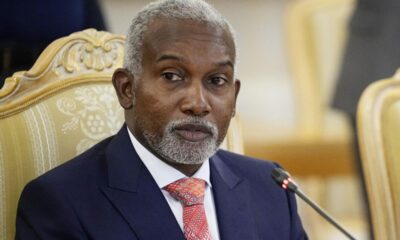Business
Nigeria Imports $14.5bn Worth Of Food, Fuel, Others In Six Months

Amid lingering dollar scarcity, Nigeria’s foreign exchange for food, fuel and other imports jumped by 45 per cent in the first half of this year compared to the same period last year.
The country spent $14.5 billion on imports in the six-month period, up from $10.04 billion in H1 2021, according to the Central Bank of Nigeria‘s (CBN) data on sectoral utilisation for transactions valid for forex.
The industrial sector accounted for the lion share of the forex supplied for imports, followed by manufactured products, food products, oil sector (petroleum products), and education services.
The external reserves of Africa’s biggest economy fell from $40.52 billion at the end of last year to $38.92 billion on August 9, 2022, CBN data show.
The country depends heavily on imports for almost everything, and this has continued to put pressure on the naira exchange rate as importers need forex, especially the United States dollar, to bring goods into the country.
The forex utilised for fuel imports increased by 35.14 per cent to $679.47 million in H1 2022 compared to a year earlier, according to the central bank.
Nigeria relies wholly on imports to meet its fuel needs as its loss-making refineries have been shut down since 2020 for rehabilitation.
The apex bank has adopted some capital controls in recent years to stabilise the naira and conserve the country’s foreign reserves.
In June 2015, the CBN excluded importers of 41 goods and services, including some food products, from accessing forex to conserve the external reserves and encourage local production of those items.
In December 2018, the bank included fertiliser on the list of 41 items classified as ‘not valid for foreign exchange in the Nigerian forex market.
The other items include rice, meat and processed meat products, chickens, eggs, tomatoes and tomato paste, and vegetables and processed vegetable products.
The central bank said in July 2019 that it would restrict the sale of forex for the importation of milk from the Nigerian forex market.
In September 2020, President Muhammadu Buhari gave a directive to the CBN to stop issuing forex for food and fertiliser imports, saying that firms that were bent on importing food should source their forex elsewhere.

-

 Technology2 years ago
Technology2 years agoVoIP Number: Everything You Need To Know
-

 Music2 months ago
Music2 months ago[Music] Gnash Ft Olivia O’Brien – I Hate you, I Love you
-

 Music2 months ago
Music2 months ago[INSTRUMENTAL] John Legend – All Of Me
-

 Music2 months ago
Music2 months agoAlan Walker – Faded [INSTRUMENTAL]
-

 Music2 months ago
Music2 months ago[Video] 21 Savage ft. Offset & Metro Boomin – Rap Saved Me
-

 Music2 months ago
Music2 months ago[Instrumental] Wiz Khalifa – See You Again ft. Charlie Puth
-

 ANE Stories4 months ago
ANE Stories4 months ago[STORY] AMAKA THE LESBIAN (Complete Episodes)
-

 Music2 months ago
Music2 months ago[Music] Akon – Sorry Blame It On Me














































